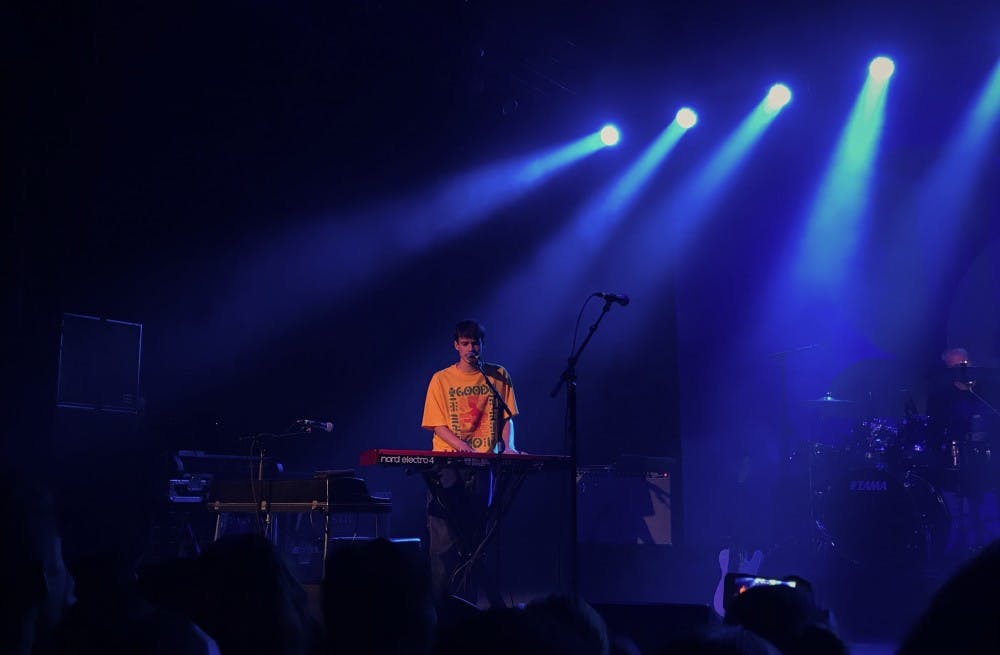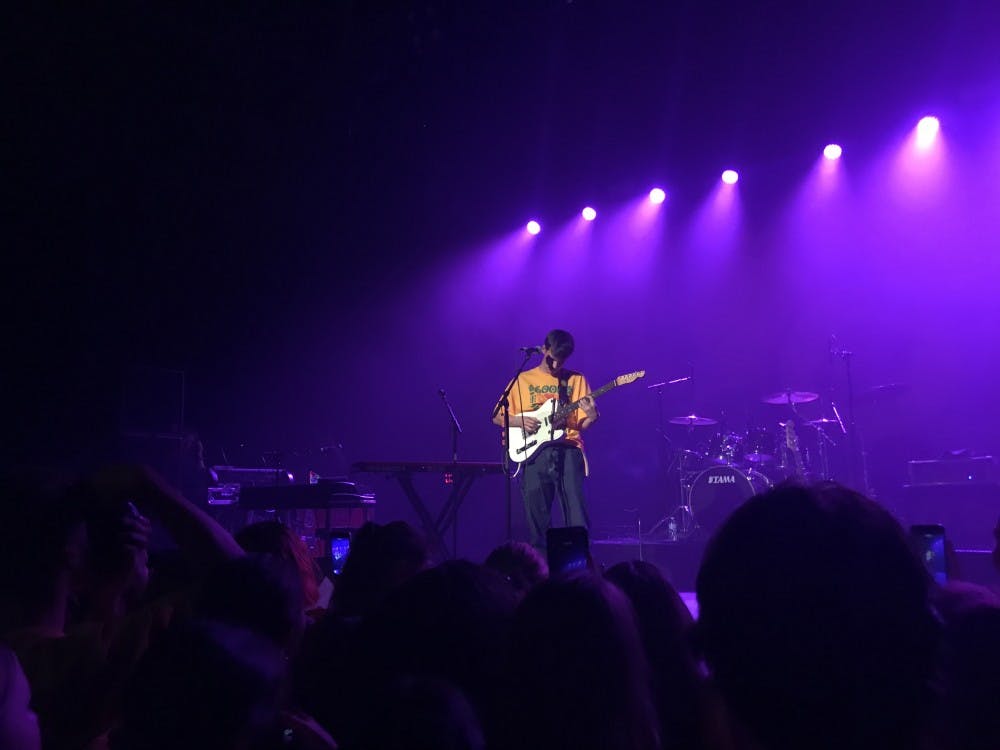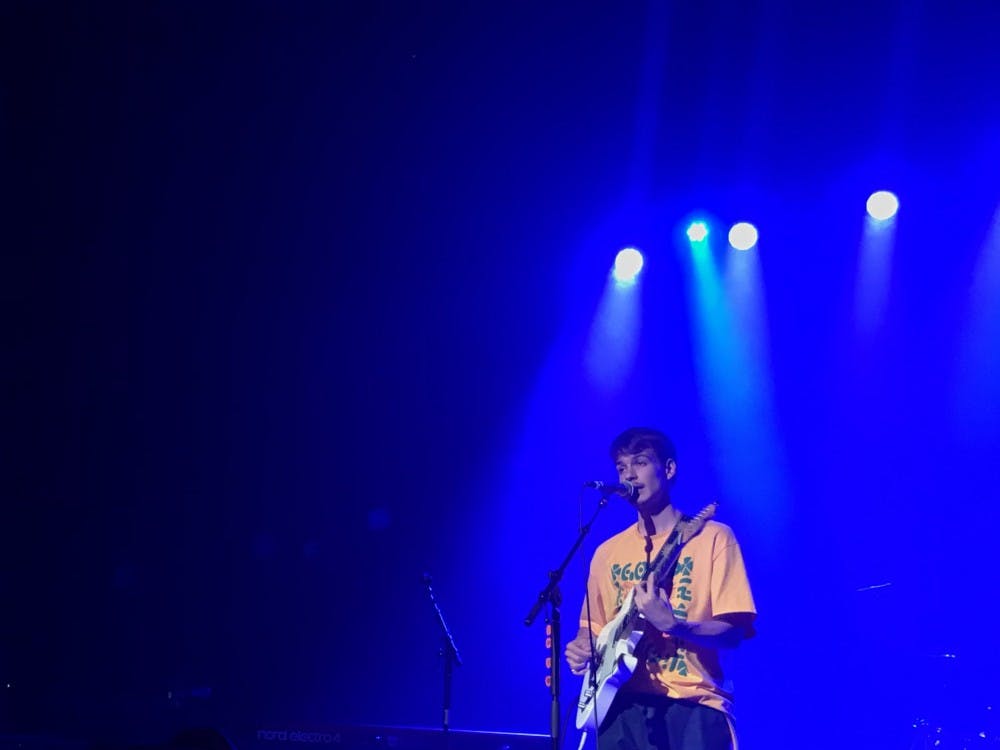The line of over a thousand Rex Orange County die–hards surrounded the block outside Union Transfer on August 2nd, over an hour before he was set to come onstage. Teenagers dressed in bright yellow, flower–power styles, equipped with Juuls and plastic bottles filled with anything but water, kept their noses to their phones as they snapchatted what might be the pinnacle of their summer.
Walking into the main room of the venue, where hundreds of fans already squeezed together, I felt the temperature rise by at least ten degrees, foreshadowing the humidity to follow. Arthur, a four–piece rock band with Philly roots, opened the night for Rex. Their live sound was punchier and more danceable than their dreamier electronic recordings, with an infectious excitement fueled by their hometown return. The lead singer, whose voice had a distinct Alex–Turner–esque twang, even took a sweet moment to wave hello to his mom and dad.
The conversations between sets were between friend groups from different local high schools, between teenagers comparing notes on their favorite Rex songs as they added each other on social media. In fact, there were moments where I felt out of place.
Though Alex O’Connor, the man behind Rex Orange County, is only a few months younger than me, I was older than the roomful of fans texting their parents an estimate of when they’d be home after the show. I wondered whether this artist, who I always thought was representative of my generation’s culture, was actually a more of a symbol for those born after the year 2000.

O’Connor began with “Apricot Princess,” following a setlist that he’s used for all of his recent American shows. The crowd immediately sang along to every word, having memorized every subtle inflection, clap, or key change of his music for this moment. He kept the energy up with some of his more upbeat songs like “Television/So Far So Good” and “Paradise,” pausing only briefly between songs to announce them or show appreciation for his fans.
He made a mid–show switch from keyboard to guitar for five songs including “Corduroy Dreams,” and a cover of Alicia Keys’ “No One,” which he dedicated to his girlfriend Thea. Ending with “Happiness” and an encore of “Loving is Easy,” the whole set clocked in at under an hour. He kept crowd interactions short but genuinely appreciative, accepting sunflowers from one fan before playing “Sunflowers,” and chucking his guitar pick into the room after he finished using it.
O’Connor took some brief keyboard and guitar solos on some songs, but nothing that was too different from those on the recorded versions. Backed by a drummer and bassist, his live music had the same jazzy R&B feel that’s become his trademark. While almost the entire room was starstruck by his mere presence, the post–show commentary was steeped in mild disappointment.

Fans wanted more. They wanted O’Connor to be more than a crooner who captured the zeitgeist of modern love. They wanted him to play more songs. They wanted him to be more engaging. They wanted him to be more than he was. That’s the thing about great expectations — they guarantee this uncomfortable feeling that comes with realizing the icons we worship are no more or less of a human being than we are.
For someone still finding his groove as a live performer that balances the deep intimacy of his music with his overwhelming mass of fans, O’Connor gave a compelling show. His dedication to mutual respect and human connection was obvious in his music, as well as in moments like one when he asked fans to put away their phones, promising them “we’ll both enjoy it more if you do.”
These words, and the crowd’s response to them, brought me both anger and hope. I had an anger for all of those who watched the concert through their phone cameras and left leaking criticisms of O’Connor’s lackluster performance, comparing him to Taylor Swift and her gimmicky stadium shows.
But despite my frustrations with the fans who listed what I thought were high points as low ones, I still have a hope the O’Connor and his music will be part of a turning point in youth and human culture that would teach us to love and appreciate each other as much as he does.

